Travelling Post Offices
By Keith Morris
Mail in England had been carried by train as early as 1830 but it was not until 1838 that it was decided to actually sort mail while the train was in operation. This was first tried on the line between Birmingham and Warrington in the January. The whole operation was such a success that before the year was out the TPO service had been extended from London (Euston) and onwards up to Preston.
In 1840 with the introduction of the Penny Black and the universal letter rates in Great Britain, the volume of mail exploded. With that increase came a rise in the number of routes for the Travelling Post Office (TPO) and by 1914 there were around 130 different routes using TPO cancellations. As the trains got faster so the number of TPO routes were cut back until by 1946 there were only 43. Eventually, by the turn of the century they were all phased out completely, the last ones running on the 9th January 2004.
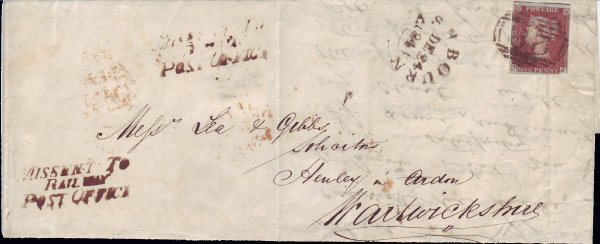
Early British TPO cover: Grand Northern Railroad - Missent to the Railway Post Office
At this date, December 1844, only one TPO existed, so there was no need to identify it as the
TPO of the "Grand Northern Railroad", later to be part of the "London & North Western
Railway". The address of Henley in Arden, Warwickshire, was probably misread as Henley on
Thames, Oxfordshire, the letter being sent by the Christmas Day, London bound TPO, due
perhaps to a combination of candle light and the Christmas spirit!
The mark is listed as W1.
With the success of the TPO system in Great Britain it was not long before all major Train routes throughout the Empire at the time had TPO vans established to carry and service mail. These countries included Ceylon and India in the East, South Africa and Sierra Leone in Africa, Canada in North America, Australia and New Zealand.
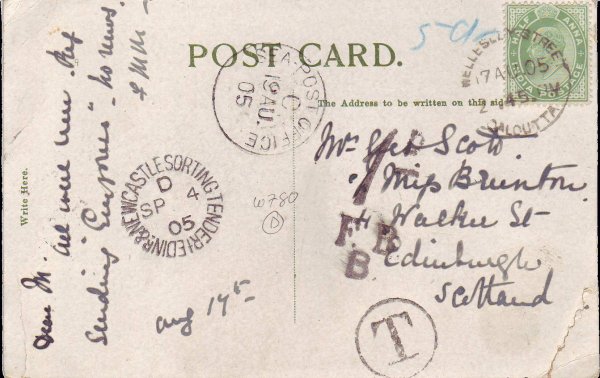
PPC from Calcutta to Edinburgh with TPO and Seapost cancels: A postcard of Eden Gardens, Calcutta posted to Edinburgh, Scotland and cancelled with a local Wellesley Street, Calcutta / 17.AU.1905 cancel; a Sea Post Office / 19.AU.1905 for its journey from Bombay to Aden; tax marks on entry into the GB and a superb strike of the Edinburgh & Newcastle Sorting Tender / D(own) / SP 4.1905 (W780).
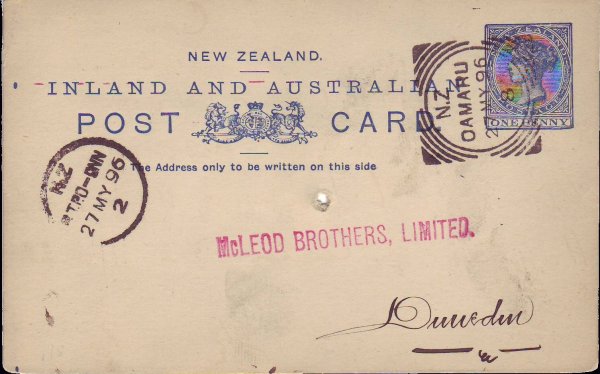
Post Card from Omaru to Dunedin on the New Zealand RTPO: A New Zealand consignment postcard sent from Omaru to Dunedin which travelled on the RTPO Down, Side 2 on 27th May 1896. The RTPO route was between Christchurch and Invecargill.
Many other countries also followed the success of the TPO system in Great Britain and it was not long before TPO routes were running all over the world, especially in Europe, the USA, South America, and Russia. Mail coming from Russia until 1918 always had a 13 day date difference as Russia used the Julian calendar while Europe used the Gregorian calendar. An envelope dated November 30th and posted in Russia would receive a December 13th datestamp in, say, Germany even though it was only the following day.
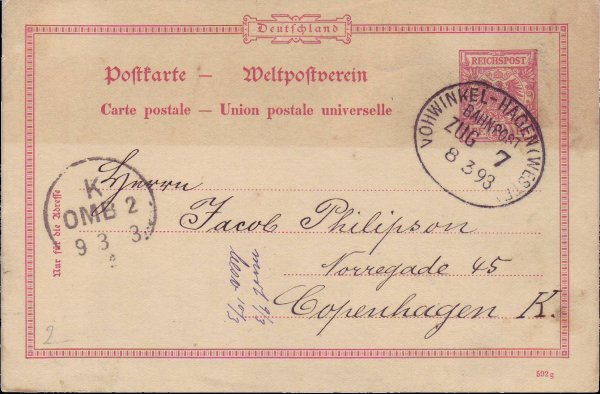
Postal card with German Bahnpost Train 7 cancellation: A plain pre-paid postcard addressed to Copenhagen and posted on the 8th March 1893 on to the Vohwinkel - Hagen (Westr) / Bahnpost / Train 7. It has the receiving mark of Copenhagen dated just one day later.
Alas, with the passing of time, so have the majority of TPO routes ceased throughout the world. At the time of writing (May 2007) it is thought that there are only five countries which still have an operating TPO system. For the avid collector this can be a problem because of the language barrier. The five countries left are China, Poland, Switzerland, Russia, and Sri Lanka, although for how long they will run their TPO operations is unknown. However, covers can be collected from these countries, but unless you know someone in the relevant country, it can be difficult.
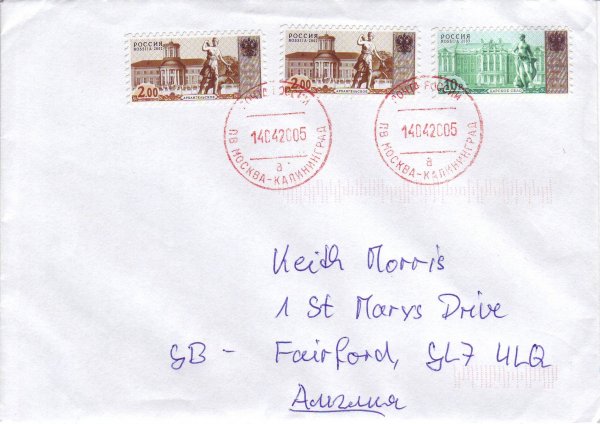
Russian Moscow - Kaliningrad TPO cancel: Dated 14th April 2005 this cover was posted on to the Moscow - Kaliningrad TPO by a group of German Bahnpost enthusiasts who were travelling around Russia.
While Great Britain and countries from the British Empire use the term TPO, other countries with TPO systems gave their operations different names. Canada and the USA used the term RPO while other countries used the names Ambulant, Ambte, Ambu, and Ambulancia. Other terms include Fahrend, Postamt, Messagieri, Postvagon, and Vagon Postal. All of these terms mean the same thing; they all signify a Travelling Post Office.
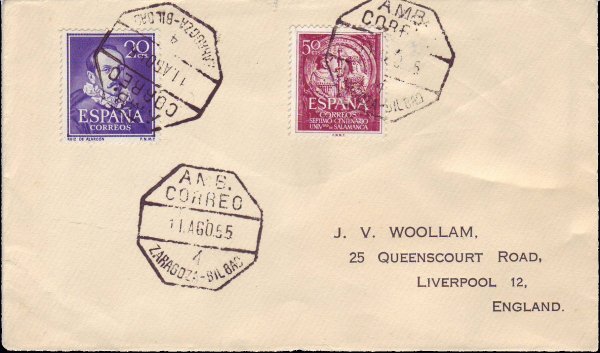
Spanish Ambulante TPO cancel dated 11.AU.1955 which ran between Zaragoza and Bilbao.
Refer to the articles on The beginning of TPOs in Great Britain and Argentinian TPOs for more explanations of terms.
Earlier in this article there was mention of the different calendars in use prior to 1918 in Russia and Europe. Here is such a cover crossing not only country borders but calendars as well! This actual cover was featured in a Society auction. Alas, the others above were not, but other similar covers will.
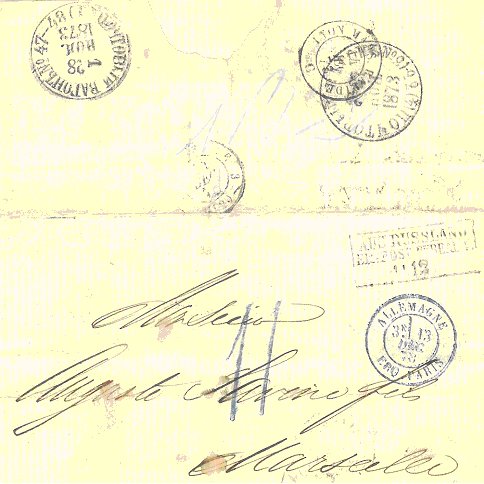
Russian Postvagons TPO cancel: Letter posted from Odessa in Russia to Marseille in France dated 1873.
Cover from Odessa with cancels dated 27th & 28th November on Russian Postvagons; a December 11th entry mark in Prussia (the following day); and cancels in France dated the 12th & 13th December before its arrival in Marseille.
For details of this cover see here.
Finally, for an example of the sort of interesting things you may find if you collect TPO covers, here is an image of a rare EDINBURGH & BERWICK Sorting Tender Cancel.
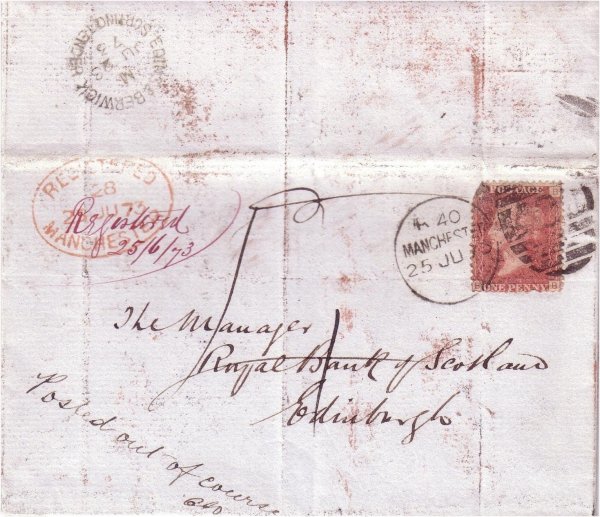
Entire from Manchester to Edinburgh, mailed at the 1d per ounce GB inland rate, which was found to contain coin at the Manchester sorting office. Consequently the entire was marked 'Posted out of course' and registered. It was despatched via the EDINR & BERWICK SORTING TENDER rather than the more usual Edinburgh & Carlisle Sorting Carriage.
This duty had a relatively short life, from 1870 to 1885, and the late Harold Wilson only recorded one postmark (W787) in use from 1873 to 1885.
The entire was registered and posted in Manchester on 25th June 1873, the penny postage prepaid with the penny red (plate 50) and the registration fee noted with the hand-written "4d" and "Registered - 25/6/73"
The normal route for the letter would have been via the Manchester Sorting Tender to Crewe and then north to Carlisle where it would have been walk sorted for Edinburgh on the Edinburgh & Carlisle Sorting Carriage (and possibly receiving one of the "EDINR M" postmarks as a backstamp). So how did it end up at Berwick on Tweed? I think that it somehow missed the connection with the Manchester ST and was sent to Stalybridge where it would have put into the Midland TPO Going North to Newcastle on Tyne and from there, forwarded on to Berwick.

